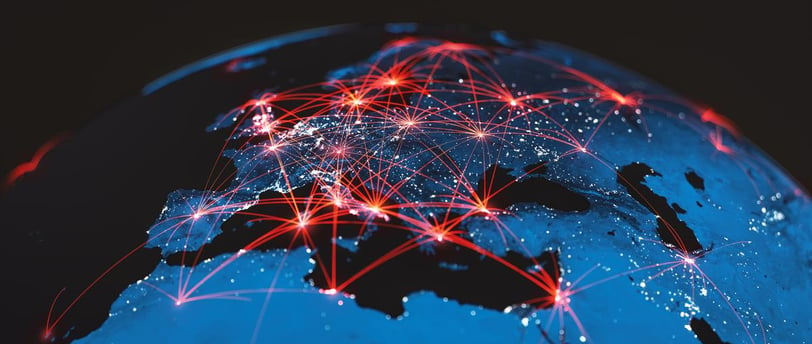License to Outwit: The Symphony of Secrecy and Strategy
Adrija Bhattacharjee
4/18/20254 min read


‘Quietly Redrawing The Maps of Power’
In a world where confidentiality is power and information is currency, the quiet revolution unfolding in the shadowy world of intelligence bureaus and secret service agencies is gradually becoming eminent as we approach the mid-2020s, with a tumultuous world order where the only alternative to coexistence is turning out to be codestruction. As traditional powerhouses are still grappling with bureaucratic constraints and restrictive tactics, nations of the Global South, a region still struggling to step away from the past command of its colonial influences, are seen to be on a stark rise in the intelligence and espionage sector, employing techniques and strategies that outsmart their Northern counterparts.
What makes this rise so intriguing is the question: how do nations with fewer resources and much less global leverage manage to outsmart their more powerful Northern peers? What strategies do they know that others are yet to uncover? In this world of espionage, the rules are written daily and the shadows are not just places to hide but the very grounds of innovation, where the unexpected becomes the norm and success is measured in whispers, rather than headlines. Delving into the realm of such agencies is to realise that the essence of intelligence firms is to know, not to be known.
‘From Pawns to Players’
While intelligence studies have mostly always been focused on the Global North's successes, considering how the world’s first military intelligence agency had also been a creation of the European nation of Austria, the Global South has often been perceived as a passive subject in this area. Mainly because the origin and operation of the initial intelligence bodies in the Global South have been a result of the legacy of a long-standing colonial rule, which left many nations here with intelligence apparatuses, originally designed to serve the imperial interests. However as these developing nations gradually gained independence over the 19th-20th century timelines, they soon began to repurpose these agencies to serve their domestic interests and protect their regained sovereignty.
Now however, most states, large or small, spanning across the Global South, have an impervious convention of intelligence with multiple security organisations engaging in all manners of surveillance and espionage. Yet we see the academic sphere based on this sector still being dominated by experiences drawn from the Northern nations, primarily the USA and more importantly, the ‘Five Eyes’ alliance. Nevertheless, the landscape is changing fast as seen by the launch of the GLOBALINT project in 2024, leading to a major shift in recognising the distinctive challenges and various inimitable approaches of intelligence bureaus in the Global South.
Intelligence agencies of the Global South have always excelled in navigating complex socio-political landscapes, a result of its struggle for identity during the colonial era, the evolution of the surveillance and intelligence sector of these countries have been significant, as evidenced by Cuba.
A geographically small country with limited resources, Cuba’s intelligence operations have always demonstrated an impressive capacity, which have also rivalled those of major world powers. The ‘Wasp Network’ of Cuban intelligence agents, which infiltrated anti-Castro exile groups in Miami during the late Cold War era, unearthed several plots to carry out bombings across different places, especially in Havana. This level of deep seeking infiltration required a level of nuanced understanding of long-term espionage missions — something which even well funded and fully equipped Northern agencies struggle with due to various political reservations and systemic oversight.
Similarly, India’s intelligence community has also undergone a distinct transformation since its independence. The Research and Analysis Wing (R&AW), has developed into a key player in global espionage over the years, with its modus operandi extending beyond traditional military intelligence, acting as India's external intelligence agency. Having engaged in cyber-espionage, counter-terrorist efforts and missions even in other allied nations, RAW’s adaptability and fluidity to ingenious gambits have been commendable, some notable successes being Operation Meghdoot, where RAW’s acquisition of intercepted information thwarted Pakistani plans of foraying into the Siachen Glacier region, allowing India to gain an advantageous position there; Operation Cactus, where timely collaboration of RAW with the Indian Armed Forces allowed the repelling of Tamil rebels from the Maldives, providing for the restoration of government control in the island nation; RAW’s involvement in the historic Anti-Apartheid movements and training of intelligence agents and officers in the African nations also contributed to the global fight against Apartheid movements; Most prominent activity being RAW’s “snatch operations”, meticulously designed clandestine plans for the capturing of high-profile terrorists or crime lords, ensuring national security and safety.
Whether it be Ethiopia’s National Intelligence and Security Service (NISS), known for playing a crucial role in combating terrorism in the Horn of Africa region, particularly against militant groups like Al-Shabaab, having foiled multiple such plots targeting Addis Ababa and other important cities, or Brazil's Agência Brasileira de Inteligência (ABIN) which has been instrumental in coordinating with military forces to counter and dismantle drug trafficking routes along Brazil's borders with Colombia and Peru, and also using satellite imagery and drones to track environmental crimes linked to illegal deforestation and illicit logging in the Amazon, an innovative tactic to combine environmental intelligence with counter-crime operations — a system which is becoming increasingly relevant as climate threats continue to grow — the rise of espionage capabilities in the Global South is no longer about national security only. As these developing countries continue to redefine their roles on the global stage of security based politics, this rise represents a broader struggle for emancipation in a supposedly multipolar world where only few countries still get to call the shots.
As a new world order emerges where discreteness carries more power than public proclamations, we find an intricate tapestry of intelligence, woven with resilience and hope — a reminder that even in times of darkness, light can emerge from the most unexpected places.
SOURCES-
1. “Intelligence on the Global South (GLOBALINT)” Research Project by Leiden University
2. “IC21: The Intelligence Community in the 21st Century” Report by the 104th US Congress Session
3. “Secrecy, spies and the global South: Intelligence Studies beyond the ‘Five Eyes’ alliance” by Zakia Shiraz and Richard J. Aldrich
4. A Business Today report on 7 undercover operations conducted by India’s RAW.
5. “Country Reports on Terrorism 2022: Ethiopia” by United States Department of States
6. “Brazil targets illegal logging in major Amazon raids” By Ueslei Marcelino, a news article in Reuters
7. “The Rio Times: Mexican drug cartels want to expand into Brazil, reports Intelligence agency” By Arkady Petrov
